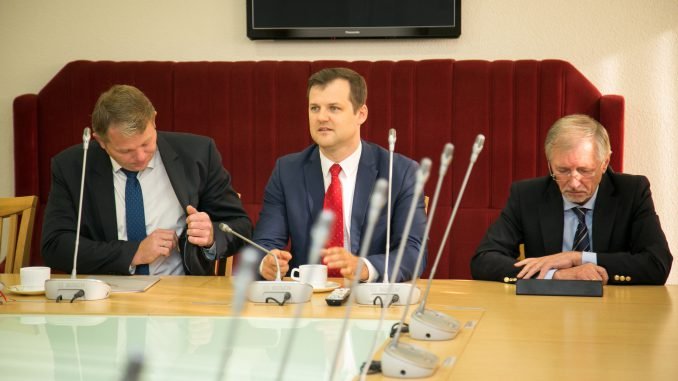
Every day we are met with a new episode of the Social Democrat soap opera. Everything we need to hold our attention. The situation changes every day and the viewer cannot relax and miss a single episode. Every episode ends with an intriguing “until the next episode.” But it would be good to finally see this soap come to an end because even for the Social Democrats themselves it would appear to prevent doing particularly important things and begin seriously thinking about the party’s future and reform Rima Urbonaitė wrote in LRT.lt.
Among a is plenty of discussion, debates, hot air and opinion changes, a document went unnoticed, which had to display the party’s new direction, innovation and the new team’s capacities. As promised, the Social Democrat manifesto was announced. Just that Gintautas Paluckas himself would appear to not have spoken much about it. Or more accurately, it was overall impossible to find a statement by the party chairman. You may say that the manifesto is a minor detail, but it has appeared and likely that its creators were intent on sending a message. After all everyone is exactly waiting for the unveiling of a clear message in these thoughts about change. But the devil lies in the details.
The impression arises, that the manifesto’s authors forgot that we already live in 2017. The 12 pages are bleak. It is doubtful whether it was read by the majority of party members and likely an even smaller number managed to finish reading. There is nothing easier than to once again repeat all the problems in Lithuania and write up aims that would reflect the Social Democrats’ ideological views. The “Farmers” spoke of problems during their electoral campaign too, primitively explaining that they are due to the stagnant and dazed parties and that they would resolve the problems, protect the poor and so on and so forth. But then novelty was at play. Meanwhile the Social Democrats are the party which has been in power the longest in Lithuania (if we include LDDP rule). And you cannot draw a line so easily between these and those, some sort of new party members. Haroldas Mackevičius (a famous humorist) accurately quipped on Facebook, commenting on an image of social democrats leaving the Ministry of Economy, asking “Are you “Paluckists” or “Kirkilists”?” and proposing to sew on some sort of distinguishing insignia to make them easier to tell apart.
The manifesto’s text is full of epithets and the various catchy phrases smell strongly of pesticide. Youth would overall be incapable of reading such a text because good ideas simply disappear behind various winged phrases. What are these banal statements for: “the major corporations have no scruples in exploiting working people”, “unregulated markets eat their own children”, “small businesses are losing against large corporate sharks in the competitive struggle”? You may ask whether inequality problems do not exist. Of course they do and resolving them is simply mandatory for our country. But the text itself does not lack completely abstract statements (e.g. “We will support modern medical technologies capable of allowing the elderly to maintain their dignity and various opportunities.” What is this? What is it about?). The content and the form the ideas are presented in is definitely not what the party should be writing when the calendar shows the year 2017 and renewal is being talked about.
What is even more peculiar is that the document is more akin to some sort of statement to the “Farmers” (they are mentioned several times) and not a document which could remain relevant for years to come. Is it really worth complaining in the manifesto that the populist “Farmers” took over the Social Democrat agenda? The Social Democrats themselves gifted it, having never been such. And after all the “Farmers” simply took the path of least resistance, responding to people’s wishes, something the Social Democrats have long forgotten and which the “Farmers” themselves appear to be forgetting, having been entangled in political intrigue. As such the question stands, how long this document will remain relevant. Perhaps the “Farmers” will no longer exist after the next elections because the voters are, after all, unpredictable.
Nevertheless, both the critics and the fervent supporters are rooting for the LSDP to renew itself, for a leftist party to appear, where the left is not simply in documents, particularly ones that show the “revolutionaries'” entanglement in a past age. And so far other than the idea to be rid of the old party nomenclature, nothing else is to be seen. G. Paluckas is even fortunate that the nomenclature is giving him the opportunity to be rid of the ballast, which has long encumbered the party. It would be unfortunate if being rid of the ballast, the party would remain floating on the water surface. We need strong parties, we need the left and the right, we need their healthy competition and clear, possible ideas. Not manifestoes that are lacking content and form like this, promising not a bright tomorrow for the party, but that we will finally be reading not manifestoes, but obituaries for the party.

Be the first to comment